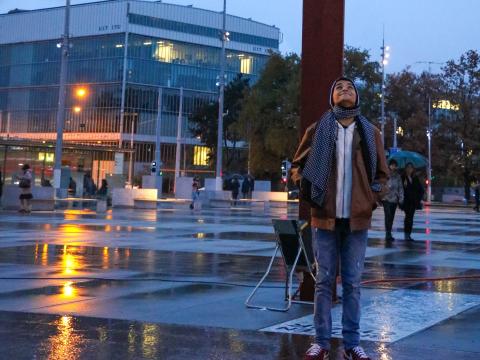30 Years of the Convention on the Rights of the Child in Brazil

By Carlos, 15, and Samila, 15, Youth Monitoring of Public Policies members in Brazil
This year we had the 30th anniversary of the Convention on the Rights of the Child. We need to celebrate such an important occasion, since this Convention is a major achievement. It shows how we can fight against actions that are harmful to us.
It is not difficult to talk about the importance of the Convention. Although many children and adolescents still suffer, there are people who care about and fight for this cause.
Knowing that children and adolescents are losing their rights due to irresponsible actions of others is unacceptable! I believe that everyone deserves to have their rights and duties respected, especially those who are not able to fight for themselves yet.
Children need something that will ensure their protection, they need special attention so that they don’t have their rights denied: the right to learn, to have access to education from preschool until high school; access to culture, arts, sports, so they have a proper development and don’t grow up as frustrated, dysfunctional people, with psychological problems and the possibility of transferring these problems to other people or even their own children.
The right to have a house to live, good education, good quality health services, just to mention a few, are essential rights in the lives of all people. Children and adolescents have the responsibility to fight for these services, but it is also their right to have access to them.
If these rights are not guaranteed, if children are not protected, they will be at risk: they may be forced to work, they may be sexually exploited, abused, or become victims of forced early marriage or drug abuse, and this would have serious consequences for the rest of their lives.
Talking about this theme involves awareness, family and a sense of welcome, either by the family or by the Legal System. In Brazil there is legislation that aims to ensure that all children are cared for and protected, according to the Law of the Child and Adolescent: "Article 227: It is the duty of the Family, the Society and the State to ensure that children and adolescents, as absolute priority, have their right to life, health, food, education, leisure, professional qualification, culture, dignity, respect, freedom and family and community interaction guaranteed, besides keeping them safe from all forms of negligence, discrimination, exploitation, violence, cruelty and oppression."
However, this law has not been properly put into practice. In my community, for example, we still see many children selling things on the street in order to survive; many of them do not attend school because there aren’t enough seats available or they drop out of school due to family matters. Many times the institution does not worry about these issues, does not follow them properly and the children end up having no good possibilities in life.
That’s why it is important to monitor which rights are being guaranteed, what is working properly and what needs to be improved regarding the protection of our children, so that they are not abused, harmed or forgotten. Children need to participate, share their opinions and feel valued.
In our community, we are members of the CAYP Committee (Children, Adolescents and Young People), where young people who live in the same neighborhood get together for leisure activities, meetings and actions to fight for justice. They discuss themes, plan and execute the actions, which are always based on Convention on the Rights of the Child.
The Convention on the Rights of the Child is important because we are able to analyze what is being done and what is affecting children in a way that can provide more attention and try to find solutions so they can have a nice, safe and happy life. There’s no better way to discuss what harms children than to hear from them, since they are the ones who feel it. That’s why it also very important to also ensure the participation of children and adolescents.
We need to value and act towards the improvements we want to see; we need to work together and evolve together. Children must have access to their rights and to activities that are appropriate for them, so that one day these hard times are merely memories.